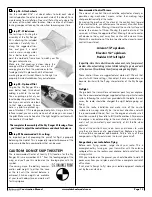
CONSTRUCTION
MANUAL
Specifications
: Wingspan: 60 in. • Wing Area: 527 sq in.
Airframe Length: 42.75 in. • Weight: 3.5-4.5 lb.
www.oldschoolmodels.com
Using the Manual
Be sure to read each step thoroughly before you start
the step. Test-fit the parts together to make sure they
fit properly. If necessary trim to fit.
Beside each step you will notice a check box (or two).
These are so you can keep track of your progress
while building your kit. For steps that have two boxes,
as in the construction of the left and right wing halves,
these steps must be performed two times.
• Your
Old School Model Works
aircraft should not be
considered a toy, but rather a sophisticated, working
model that functions very much like a full-size airplane.
Because of its performance capabilities, this model, if not
assembled and operated correctly, could possibly cause
injury to yourself or spectators, and damage to property.
• You must assemble this model according to the
instructions. Do not alter or modify this model, as doing
so may result in an unsafe or un-flyable model. In a few
cases the instructions may differ slightly from the photos.
In those instances the written instructions should be
considered as correct.
• You must take time to build straight, true and strong.
• You must use a R/C radio system that is in first-
class condition, a correctly sized power system and
components (electronics, batteries, wheels, etc.)
throughout the building process.
• You must correctly install all R/C and other components
so that the model operates correctly on the ground
and in the air. (Installation shown in the manual is a
suggestion. You may have to adjust the mounting steps
to accommodate the size of your radio equipment.)
• You must check the operation of the model before every
flight to insure that all equipment is operating and that
the model has remained structurally sound. Be sure to
check clevises or other connectors often and replace
them if they show any signs of wear or fatigue.
• If you are not an experienced pilot or have not flown this
type of model before, we recommend that you get the
assistance of an experienced pilot in your R/C club for
your first flights. If you’re not a member of a club, your
local hobby shop has information about clubs in your
area whose membership includes experienced pilots.
• While this kit has been flight tested to exceed normal
use, if this model will be used for extremely high stress
flying, such as racing, or if a power system larger than
one in the recommended range is used, the modeler is
responsible for taking steps to reinforce the high stress
points and/or substituting hardware more suitable for the
increased stress.
Remember: Take your time and follow
the instructions to end up with a well-
built model that is straight and true.
Sky Ranger 40 prototype


































